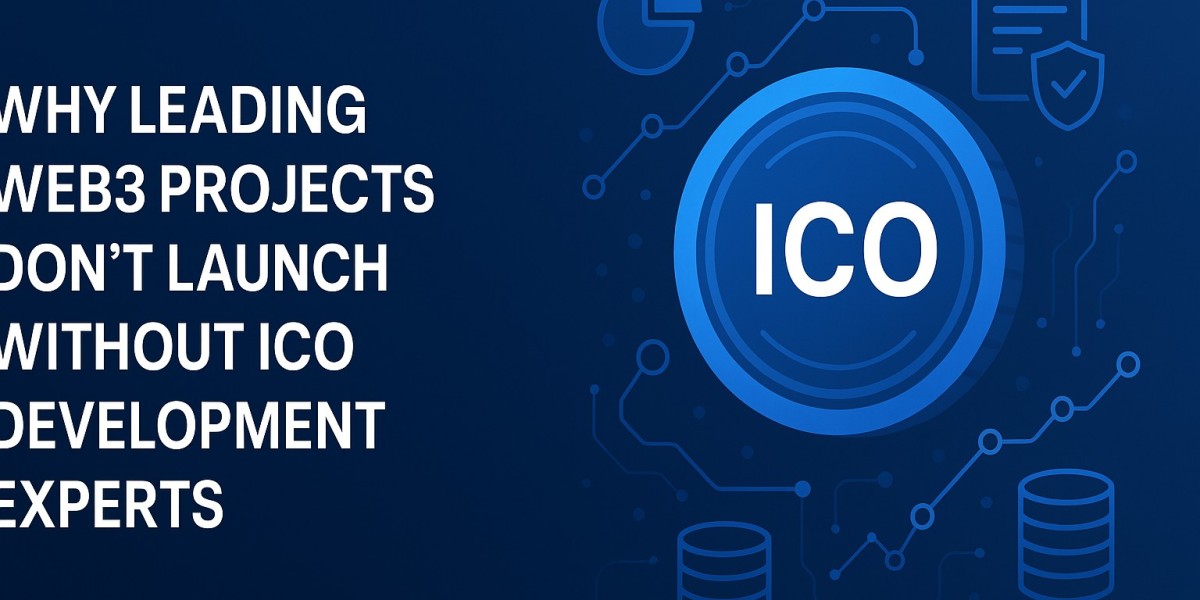In the fast-moving world of Web3, where decentralization, transparency, and tokenized ecosystems dominate the narrative, the Initial Coin Offering (ICO) remains one of the most powerful fundraising models. From Ethereum’s groundbreaking token sale in 2014 to modern Web3 startups raising millions in days, ICOs have proven their potential to provide capital and community at scale.
Yet, success is far from guaranteed. For every headline-making ICO, dozens more fail due to poor planning, weak compliance, or a lack of trust among investors. This gap between aspiration and execution is exactly why leading Web3 projects rarely launch without the guidance of ICO development experts. These specialists combine technical knowledge, legal expertise, and marketing strategy to ensure a project’s token sale is both compliant and successful.
This article explores in depth why ICO development experts are indispensable in Web3, what roles they play across the fundraising journey, and how their involvement maximizes trust, transparency, and long-term viability.
The Complex Landscape of ICOs in Web3
1. The Evolution of ICOs
2014–2017 boom: Early ICOs like Ethereum and Filecoin raised massive sums with little regulation.
2018 correction: Scams and weak projects led to investor skepticism and stricter scrutiny.
2020 onwards: A more mature Web3 environment, with hybrid models (STOs, IDOs, IEOs) and regulatory oversight, requires professional expertise.
The ICO landscape is no longer a “wild west.” Investors now demand detailed whitepapers, secure smart contracts, and legal assurances. Without experts, projects struggle to meet these standards.
2. Regulatory Uncertainty
Governments worldwide continue to adapt their stance on crypto fundraising. Compliance with KYC/AML regulations, tax reporting, and securities law is critical. ICO experts guide teams through this complex, shifting environment.
3. Investor Expectations
Today’s investors are more discerning. They look for:
Transparent tokenomics
Verifiable smart contracts
Active community building
Real-world utility
Meeting these expectations requires more than just technical talent; it requires a multidisciplinary team.
Role of ICO Development Experts
ICO development experts cover multiple areas, acting as the backbone of a successful launch. Let’s break down their responsibilities.
1. Strategic Planning
Experts help founders design an ICO roadmap, answering key questions:
What type of token (utility, governance, or security) best fits the project?
Should the sale follow a private, pre-sale, or public structure?
How will milestones align with token distribution?
This upfront clarity prevents costly mistakes later.
2. Tokenomics Design
Poorly designed tokenomics often doom projects. ICO experts craft sustainable models by:
Defining supply caps and emission schedules
Allocating tokens to founders, investors, and community incentives
Balancing scarcity with liquidity
Modeling long-term value creation
They use real-world benchmarks to ensure investor confidence.
3. Smart Contract Development
Security is everything. Experts ensure:
Audited, bug-free contracts
Automation of vesting and lock-up periods
Transparent fundraising mechanisms (e.g., caps, refunds)
Interoperability with exchanges and wallets
High-profile hacks have cost ICOs millions. Expert oversight mitigates these risks.
4. Regulatory and Legal Support
ICO development teams often work with legal professionals to:
Navigate securities laws in major jurisdictions
Set up compliant KYC/AML frameworks
Draft terms of sale and privacy policies
Reduce liability for founders
This protects both the project and its investors.
5. Marketing and Community Growth
A technically sound ICO still fails without community trust. Experts design campaigns using:
Social media, PR, and thought leadership
Influencer partnerships in crypto spaces
Discord/Telegram community management
Transparency reports and AMAs
A strong, engaged community translates directly to higher participation rates.
6. Exchange Listings and Liquidity
ICO experts help with exchange integration by:
Preparing token standards (ERC-20, BEP-20, Solana SPL, etc.)
Negotiating exchange listing requirements
Ensuring post-ICO liquidity
Liquidity builds investor trust and ensures real utility for the token.
Why Web3 Projects Depend on ICO Development Experts
1. Avoiding Costly Mistakes
Failed ICOs often stem from avoidable missteps:
Token supply mismanagement leading to inflation
Smart contract bugs draining funds
Regulatory breaches resulting in lawsuits
Poor marketing leading to weak investor turnout
Experts prevent these errors through tested frameworks.
2. Building Trust and Credibility
Investors back projects that demonstrate professionalism. A whitepaper prepared by experts, audited smart contracts, and transparent compliance measures increase credibility exponentially.
3. Accelerating Time to Market
With experts handling compliance, security, and fundraising structure, founders can focus on product development. This shortens launch timelines without compromising quality.
4. Long-Term Sustainability
ICO experts don’t just plan for fundraising. They ensure token ecosystems can sustain growth:
Governance frameworks for DAO participation
Incentive mechanisms to prevent pump-and-dump cycles
Partnerships with DeFi and NFT platforms for real-world utility
5. Handling Global Participation
Since ICOs often attract investors worldwide, experts ensure:
Multi-currency support
Localized compliance mechanisms
Multilingual marketing campaigns
This global approach broadens the investor pool significantly.
Real-World Examples of ICO Success with Experts
Ethereum (2014)
Ethereum’s ICO raised $18 million with clear tokenomics and a strong roadmap. The project worked with multiple legal and technical advisors, setting the gold standard for future ICOs.
Filecoin (2017)
Filecoin raised $257 million, largely due to its detailed whitepaper, compliance measures, and institutional partnerships. Expert involvement reassured investors.
Polkadot (2017)
Polkadot’s $145 million raise came with advanced governance mechanisms and expert-designed token distribution, ensuring the project’s long-term sustainability.
Case Study: Failed ICOs Without Experts
Projects like BitConnect collapsed due to lack of transparency and professional oversight, leaving investors burned and the industry’s reputation damaged. These failures underscore why expertise is non-negotiable today.
Future of ICO Development in Web3
The role of ICO experts will expand as Web3 evolves:
Integration with DeFi: Experts will design liquidity pools and staking incentives.
Cross-chain fundraising: Multi-chain token sales will require technical coordination.
Hybrid models: Combining ICOs with STOs and IDOs will demand regulatory and technical sophistication.
AI in fundraising: Predictive analytics will guide investor targeting and fraud detection.
As innovation continues, projects will lean even more heavily on experienced ICO specialists.
Final Thoughts
In today’s Web3 ecosystem, an ICO is far more than a fundraising event it is the foundation of trust, community, and long-term viability. Leading projects recognize that ICO development experts are not optional but essential. They bring structure to complexity, ensure compliance in uncertain regulatory waters, and build the credibility needed to win investor confidence. The success stories of Ethereum, Filecoin, and Polkadot prove that professional guidance makes the difference between a short-lived hype cycle and a sustainable Web3 ecosystem. On the other hand, the collapse of poorly managed ICOs is a stark warning of what happens when projects cut corners. For Web3 founders with bold ideas, the message is clear: don’t launch without the experts. The risks are too high, the competition too fierce, and the stakes too great. Partnering with seasoned ICO developers ensures not just a successful token sale but a thriving project that can weather the challenges of tomorrow’s decentralized world.








